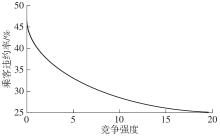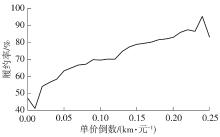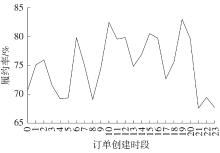| 1 |
UK OFT .Personalised pricing—increasing transparency to improve trust[M].[S.l.]:OFT 1489,2013.
|
| 2 |
BIGWOOD R .Exploitative contracts[M].[S.l.]:Oxford University Press on Demand,2003.
|
| 3 |
喻玲,兰江华 .算法个性化定价的反垄断法规制:基于消费者细分的视角[J].社会科学,2021(1):77-88.
|
|
YU Ling, LAN Jianghua .Anti monopoly law regulation of algorithm personalized pricing:from the perspective of consumer segmentation[J].Journal of Social Sciences,2021(1):77-88.
|
| 4 |
李旭东 .平台企业价格轴辐合谋的认定[J].北京化工大学学报(社会科学版),2020,10(1):90-95,117.
|
|
LI Xudong .Conclusion of hub-and-spoke of price of platform enterprise[J].Journal of Beijing University of Chemical Technology(Social Sciences Edition),2020,10(1):90-95,117.
|
| 5 |
李丹 .算法歧视消费者:行为机制、损益界定与协同规制[J].上海财经大学学报,2021,23(2):17-33.
|
|
LI Dan .Algorithmic discrimination against consumers:behavior mechanism,profit and loss definition,and compound regulation[J].Journal of Shanghai University of Finance and Economics,2021,23(2):17-33.
|
| 6 |
李建培,廉涛,张晚烛 .差别定价:最新研究进展及政策启示[J].管理学刊,2021,34(2):21-37.
|
|
LI Jianpei, LIAN Tao, ZHANG Wanzhu .Differential pricing:latest research and policy implications[J].Journal of Management,2021,34(2):21-37.
|
| 7 |
WANG X, LIU W, YANG H,et al .Customer behavioral modeling of order cancellation in coupled ride-sourcing and taxi markets[J].Transportation Research Part B:Methodological,2020,132:358-378.
|
| 8 |
MEHDI N, MOHSEN R .Ride-sourcing modeling and pricing in non-equilibrium two-sided markets[J].Transportation Research Part B:Methodological,2020,132:340-357.
|
| 9 |
郑小红,龙军,蔡志平 .关于网约车订单分配策略的综述[J].计算机工程与科学,2020,4(7):1267-1275.
|
|
ZHENG Xiao-hong, LONG Jun, CAI Zhi-ping .A survey of order dispatch policy based on online ride-hailing services[J].Computer Engineering & Science,2020,4(7):1267-1275.
|
| 10 |
赵道致,杨洁,李志保 .考虑等待时间的网约车与出租车均衡定价研究[J].系统工程理论与实践,2020,40(5):1229-1241.
|
|
ZHAO Daozhi, YANG Jie, LI Zhibao .Research on the equilibrium pricing of online car-hailing and taxi services considering the waiting time[J].System Engineering-Theory & Practice,2020,40(5):1229-1241.
|
| 11 |
徐莹 .竞争性市场结构下网约车平台定价研究[J].价值工程,2020,39(20):168-170.
|
|
XU Ying .Research on pricing of online car rental platform under competitive market structure[J].Value Engineering,2020,39(20):168-170.
|
| 12 |
WANG X, HE F, YANG H,et al .Pricing strategies for a taxi-hailing platform[J].Transportation Research Part E:Logistics and Transportation Review,2016,93:212-231.
|
| 13 |
HE F, WANG X, LIN X,et al .Pricing and penalty/compensation strategies of a taxi-hailing platform[J].Transportation Research Part C:Emerging Technologies,2018,86:263-279.
|
| 14 |
林鹏飞,翁剑成,刘文韬,等 .基于多源数据的网络约租车与出租车运营特征分析[J].交通工程,2020,20(1):26-33.
|
|
LIN Pengfei, WENG Jiancheng, LIU Wentao,et al .Operational characteristics analysis of ride-hailing services and traditional taxis based on multi-source data[J].Journal of Transportation Engineering,2020,20(1):26-33.
|
| 15 |
杨燕,胥川 .出租车和网约车载客空间特征分析[J].交通运输工程与信息学报,2020,18(1):68-76.
|
|
YANG Yan, XU Chuan .Analysis the spatial characteristic of taxi and ridesourcing service trips[J].Journal of Transportation Engineering and Information,2020,18(1):68-76.
|
| 16 |
周乐欣,徐海平,李烨 .因特网约车平台双边报价交易机制创新及策略研究[J].中国管理科学,2020,28(3):201-212.
|
|
ZHOU Le-xin, XU Hai-ping, LI Ye .A bilateral bidding mechanism for cloud-based on-demand transport services[J].Chinese Journal of Management Science,2020,28(3):201-212.
|
| 17 |
HOTELLING H .Stability in competition[J].The Economic Journal,1929,39(153):41-57.
|
| 18 |
SALOP S C .Monopolistic competition with outside goods[J].The Bell Journal of Economics,1979,10(1):141-156.
|
| 19 |
ARMSTRONG M .Competition in two-sided markets[J].RAND Journal of Economics,2006,37(3):668-691.
|
| 20 |
华忆昕,许恒,马清 .网约车平台公司并购的福利效应研究[J].财贸研究,2020,31(9):88-98.
|
|
HUA Yixin, XU Heng, MA Qing .Welfare effects of M&As between online car-hailing platform companies[J].Finance and Trade Research,2020,31(9):88-98.
|
| 21 |
毕菁佩,舒华英 .基于竞争平台的新老用户定价策略分析[J].管理学报,2016,13(8):1257-1262.
|
|
BI Jingpei, SHU Huaying .Uniform pricing or discrimination pricing for new and old users?—Pricing strategy analysis of competitive platforms[J].Chinese Journal of Management,2016,13(8):1257-1262.
|
| 22 |
孙中苗,徐琪 .随机需求下考虑不同竞争情形的网约车平台动态定价[J].中国管理科学,2021,29(1):138-148.
|
|
SUN Zhong-miao, XU Qi .Dynamic pricing for ride-hailing platforms with different competition conditions under stochastic demand[J].Chinese Journal of Management Science,2021,29(1):138-148.
|
| 23 |
金振广,胡大伟,吴雪 .网约车排队等候条件下乘客服务类型选择演化博弈分析[J].交通工程,2019,19(6):66-71,78.
|
|
JIN Zhenguang, HU Dawei, WU Xue .Evolutionary game analysis of passengers’ service type selection under queuing and waiting conditions of online car-hailing[J].Journal of Transportation Engineering,2019,19(6):66-71,78.
|
| 24 |
康凯,王旭阳,张敬 .分享经济下竞争市场双边网约车平台定价策略[J].计算机工程与应用,2021,57(13):227-232.
|
|
KANG Kai, WANG Xuyang, ZHANG Jing .Pricing strategy of bilateral ride-hailing platform based on duopoly competition in sharing economy[J].Computer Engineering and Applications,2021,57(13):227-232.
|
| 25 |
林昌,冯苏苇 .基于大数据的网约车平台定价规则分析[J].交通与港航,2020,7(1):5-11.
|
|
LIN Chang, FENG Suwei .Analysis of pricing rules for ride-hailing platform based on big data[J].Comminication & Shipping,2020,7(1):5-11.
|













